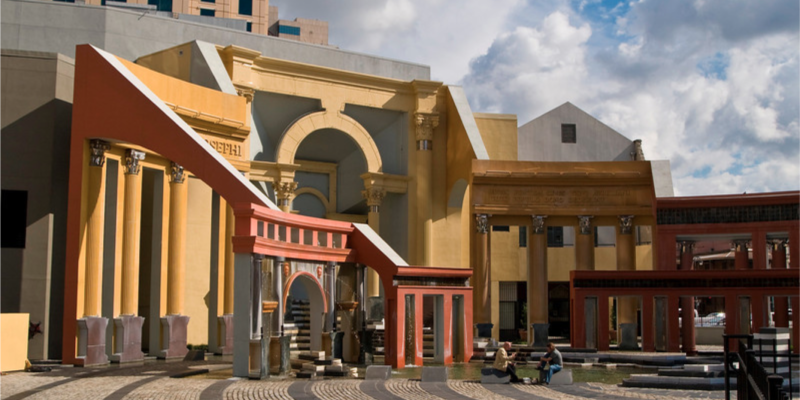We explain what postmodernism is and what its general characteristics are. Also, how is postmodern society and its architecture.
What is Postmodernism?
Postmodernism is a philosophical , cultural and artistic movement that emerged at the end of the 20th century , as a reaction to the intellectual and philosophical ideas of the Enlightenment period and the rest of the modern period (between the 17th and 19th centuries). It was a movement that succeeded modernism , hence the origin of its name.Postmodernism opposed the concepts that reality is natural , objective and independent of the human being , holding that they were ideas based on naive realism. The new movement stood out for its skepticism or rejection of the trend of "enlightened reason."
Postmodernism was based on the concept of "difference" as a productive mechanism, rather than the denial of identity to what was known up to that moment. He argued that thinking and what forces humans to act is a matter of sensitivity rather than reason (which is governed under its own laws).
Characteristics of postmodernism
 Postmodernism was characterized by breaking with the established rules about art and by introducing a new era of freedom in which "anything goes". It was an anti-authoritarian current by nature because it refused to recognize the influence of any style.
Postmodernism was characterized by breaking with the established rules about art and by introducing a new era of freedom in which "anything goes". It was an anti-authoritarian current by nature because it refused to recognize the influence of any style.The movement was shown with a humorous, ironic and even ridiculous tone, in order to challenge the limits of collective taste. He had an anti-dualist stance that opposed preconceptions such as east-west, man-woman, rich-poor or white-black.
Postmodernism exerted its influence in three aspects: in a historical period, in a philosophical current and in an artistic movement. However, it failed in its attempt to be independent of the human being , something that is unattainable.
The postmodernist movement was characterized by considering that:
- The philosophy Western created dualisms. Instead, postmodernism maintained a hybrid or pluralistic stance.
- Truth is a matter of perspective or context, rather than something universal or absolute.
- The language shapes the way we think and can not be thought without language.
- Language is capable of literally creating reality.
Postmodern architecture
 Postmodern architecture stood out for being of an indefinite type , without opposing any of the known styles, although it managed to differentiate itself from them. It replaced modern aesthetics without ornamentation and right angles, with irregular lines and unusual surfaces.
Postmodern architecture stood out for being of an indefinite type , without opposing any of the known styles, although it managed to differentiate itself from them. It replaced modern aesthetics without ornamentation and right angles, with irregular lines and unusual surfaces.Some examples of postmodern architecture are: the State Gallery in Stuttgart (in Germany) , the Piazza d'Italia public square in New Orleans (in the United States) and the Scottish Parliament Building at Holyrood (in Scotland).
The architects of modernity may regard postmodern buildings as vulgar or with a populist ethic. By contrast, postmodern architects may regard modern works as soulless and too bland facades.
Postmodern literature
 Postmodern literature was characterized by an ideology and style that appealed to fragmentation, diversity, paradox , little-known storytellers, parody, and "black humor." It rejects the distinction between genres and forms of writing .
Postmodern literature was characterized by an ideology and style that appealed to fragmentation, diversity, paradox , little-known storytellers, parody, and "black humor." It rejects the distinction between genres and forms of writing .The literature of the 1990s in Latin America evidenced a trend towards postmodern experimentation , with some of its most prominent exponents, such as Ricardo Piglia, Diamela Eltit, Rafael Humberto Moreno-Durán, José Balza, and José Emilio Pacheco.
Postmodern authors identified themselves by walking a fuzzy boundary between fictional discourses and essays : they wrote fictions about literature and essays in fiction mode.
Postmodern society
 During the development of postmodern society, it went from a production economy to a consumer economy , including a compulsive consumerism that caused harmful consequences that can be seen today.
During the development of postmodern society, it went from a production economy to a consumer economy , including a compulsive consumerism that caused harmful consequences that can be seen today.To counteract the negative consequences, postmodernism began to question the environmental disasters caused by the overexploitation of natural resources and the amount of toxic waste generated. He proposed a revaluation of planet Earth and awareness for its care.
The above content published at Collaborative Research Group is for informational and educational purposes only and has been developed by referring reliable sources and recommendations from technology experts. We do not have any contact with official entities nor do we intend to replace the information that they emit.
Luke is passionate about fostering student involvement and connection. He studied psychology for his major and likes learning about the past. Luke aims to specialize in artificial intelligence and cybersecurity. .
Leave a reply
Your email address will not be published. Required fields are marked *Recent post

Sport: What Is It, Types, Risks, Features, Characteristics and Examples
September 23, 2021

Dogs: Emergence, Features, Characteristics, Feeding and Breeds
September 24, 2021

Story: Definition, Elements, Structure, Features and Characteristics
September 24, 2021

Essay: Definition, Structure, Features, Characteristics, How to Do It
September 24, 2021
